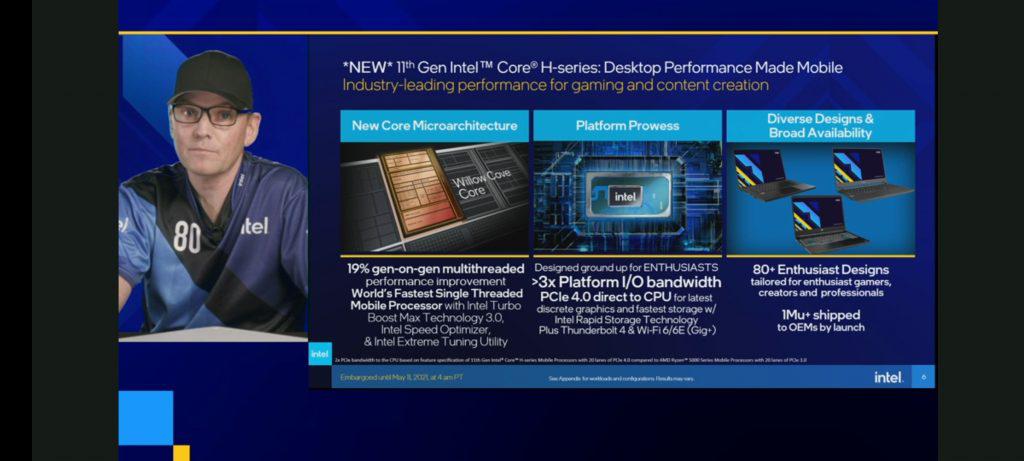Intel has added five consumer processors and five commercial processors to its 11th Gen Core H-series generation (codenamed “Tiger Lake-H”). Both groups include three eight-core chips and two six-core chips. All of the parts are 35W, save the flagship Core i9-11980HK, which is clocked at 65W. You’ll see them in over 30 upcoming ultraportables (laptops 20mm or thinner) and over 80 workstations.
The company (unsurprisingly) says the new chips will provide significant performance improvements over their predecessors from the 10th Gen “Comet Lake” series. It claims they’ll provide a 19 percent “gen-on-gen multithreaded performance improvement.”

On the gaming front, Intel says the Core i9-11980HK will deliver significantly better frame rates than its Comet Lake predecessor on titles including Hitman 3, Far Cry New Dawn, and Tom Clancy’s Rainbow Six Siege. The company also took aim at its competitors. It claims the 11980HK also beats the rival AMD Ryzen 9 5900HX on these titles and that its Core i5-11400H (meant for thin and light laptops) will outperform the Ryzen 9 5900HS on some and come close to matching its performance on others.
Intel did not make battery life claims in its presentation. That’s a bit concerning because recent AMD-powered laptops have been excellent in that department for the past two years.
In terms of more nitty-gritty specs, the chips will support up to 44 platform PCIe lanes, Thunderbolt 4 with up to 40Gbps bandwidth, discrete Intel Killer Wi-Fi 6E (Gig+), Optane H20, overclocking with Intel’s Speed Optimizer (on some SKUs), 20 PCIe Gen 4 lanes with RST-bootable RAID0, and turbo boost up to 5.0Ghz with Intel’s Turbo Boost Max Technology 3.0.
The commercial chips will support Intel’s vPro platform, which includes a number of business-specific security features and management tools, including Intel’s Hardware Shield (which includes a new threat-detection technology that Intel says is “the industry’s first and only silicon-enabled AI threat detection”), Total Memory Encryption, and Active Management Technology. Intel says its Core i9-11950H will be up to 29 percent faster than its predecessor in product development, 12 percent faster in financial services work, and 29 percent faster in media and entertainment.
Many eyes are on these new chips, as AMD’s Ryzen 5000 mobile series took the laptop market by storm when it was announced earlier this year. Its eight-core chips have shown significant performance gains over previous generations, particularly in multi-core workloads and efficiency. Meanwhile, Apple’s Arm-based M1 chip has put up startlingly good performance numbers while maintaining incredible battery life.
Intel is playing catch-up here, and the Tiger Lake-H chips we’ve gotten to try so far haven’t been astonishing. The lightweight Vaio Z, powered by the quad-core Core i7-11375H, yielded great results on single-core benchmarks but couldn’t hold a candle to Apple’s M1 Macbook Pro in multi-core tasks. On the gaming front, we’ve also tested MSI’s Stealth 15M and Acer’s Predator Triton 300 SE (both powered by the 11375H as well). The Stealth didn’t quite achieve the frame rates we’d expect from a laptop of its price (and couldn’t take full advantage of its QHD screen), and the Predator had disappointing battery life.
I’ll have more to say about these new CPUs when I’ve gotten to test them for myself — hopefully sooner rather than later.









